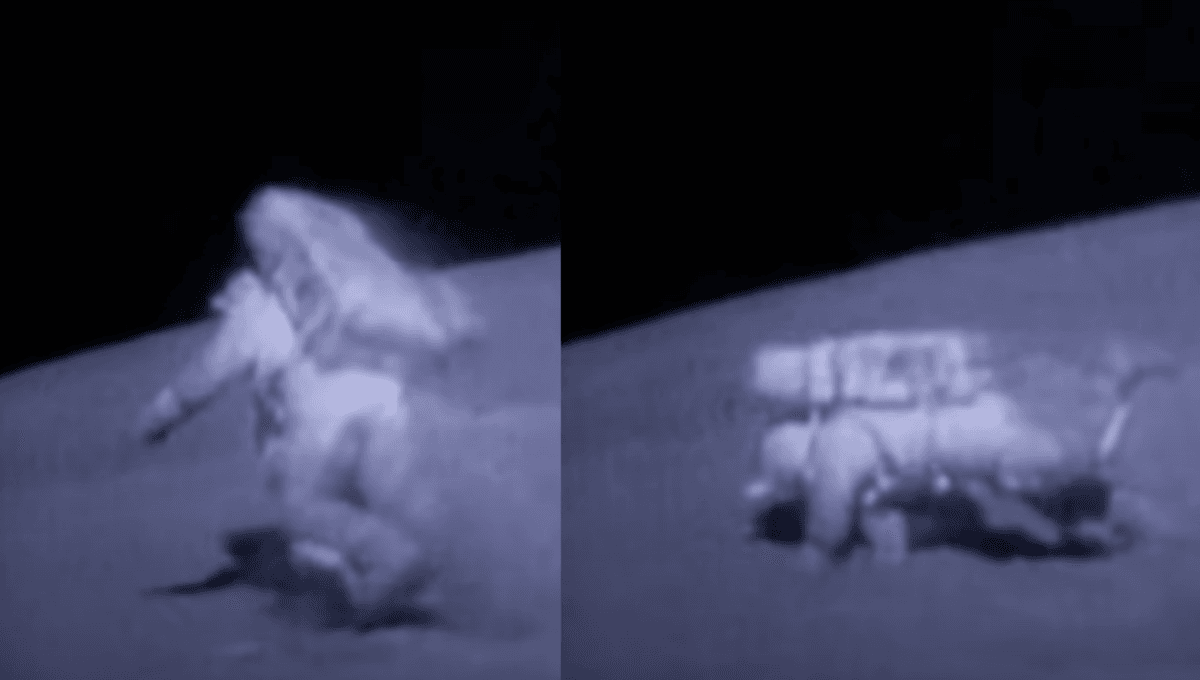
As a science website, it’s easy to get bogged down in questions like “is there life on Enceladus” and “where are all the aliens“, when people are struggling with more basic (but fun!) questions like “why can’t we power our cars with magnets” and “could people breathe the air on Mars“. One fun question we stumbled across this week is: if you fell from a great height on the Moon, would you die or otherwise get badly injured?
Of course, in real life, any small fall on the Moon could potentially be quite deadly. During one Moon walk, astronaut John Young turtled himself while attempting to join in the “Moon Olympics”.
“I decided to join in and made a big push off the moon, getting about 4 feet [1.2 meters] high,” Young explained in the book Moonwalker by Charlie and Dotty Duke years later. “But as I straightened up, the weight of my backpack pulled me over backward. Now I was coming down on my back. I tried to correct myself but couldn’t, and as my heart filled with fear I fell the 4 feet [1.2 meters], hitting hard – right on my backpack.”
“Panic!” he continued. “The thought that I’d die raced across my mind. It was the only time in our whole lunar stay that I had a real moment of panic and thought I had killed myself. The suit and backpack weren’t designed to support a 4-foot [1.2-meter] fall.”
But say suits weren’t a problem, and you have a breathing device sorted. Would the reduced gravity of the Moon allow you to gently fall to the lunar surface, landing harmlessly like Superman?
In short, no.
Though the lower gravity will help you land softer at lower heights, it’s not going to help you a great deal if you are falling from a great height. On Earth, when you freefall you reach terminal velocity, where the drag force of the air you are moving through is equal to the downward force of gravity. At this point, there is no further acceleration.
For a skydiver spread out, this is around 200 kilometers per hour (120 miles per hour), though they can fall faster by diving feet or head first, reducing drag. At higher altitudes, where the air is thinner so drag is reduced in this way, it’s possible to fall faster still. Felix Baumgartner famously jumped from 39 kilometers (127,852.4 feet) high in 2012, reaching the speed of sound.
On Earth, acceleration due to gravity is around 9.8 m/s², whereas on the Moon it is 1.6 m/s2. But crucially, on the Moon, there is only a very thin atmosphere, meaning little drag force to slow down your acceleration as you slip and plummet from your 40-floor Moon hotel.
Say you fell from 100 meters (328 feet): by the time you hit the lunar surface you would reach the velocity of 17.89 meters per second, or 64.4 kilometers per hour (37 miles per hour). At that speed, you will very likely injure yourself. If you were to jump off the tip of the tallest skyscraper in the world (after you transferred it to the Moon, for some reason) you would reach the velocity of 51.53 meters per second, or 185.5 kilometers per hour (115 miles per hour), more than enough to cause serious damage or death.
All “explainer” articles are confirmed by fact checkers to be correct at time of publishing. Text, images, and links may be edited, removed, or added to at a later date to keep information current.
Source Link: If You Fell From A Skyscraper On The Moon Would You Get Hurt?